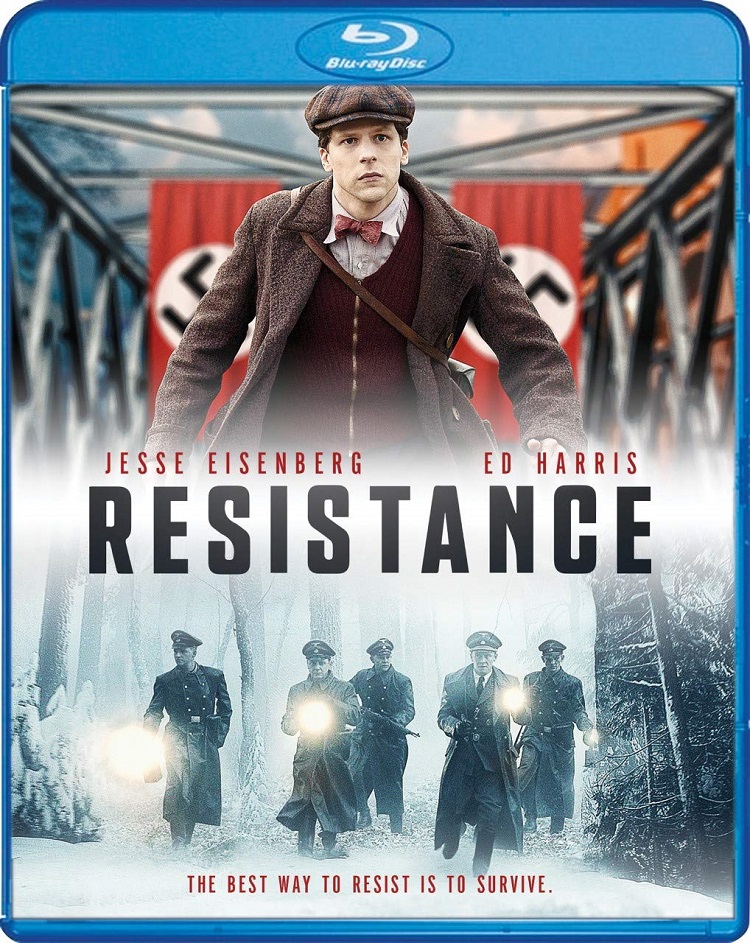
Written by Ram Venkat Srikar
Drawing parallels between current times and the setting of the film tells one thing for sure: irrespective of whether it’s the World War II or a global pandemic, humans have always found solace in some form art. We – currently locked down in our homes – are leveraging on films and TV shows on Netflix, prime, etc. Likewise, back during the Second World War, music and slapstick comedy served the same purpose. This facet is beautifully addressed in Jonathan Jakubowicz’s Resistance, which is based on the life of Marcel Marceau, one among the most prominent mime artists to ever live. But that’s not what the film’s primarily about. It tells the story of Marcel (Jesse Eisenberg), an up-and-coming comedian back in the day, who saved, thousands of orphaned Jewish children from being executed by the Nazis.
In the film’s potent opening scene, “…and they lived happily ever after” narrates the father as he finishes reading a bedtime story to his daughter, Elsbeth (Bella Ramsey). She is accompanied by her mother too. It’s a happy little family, we feel. However, unlike the book, the family sadly doesn’t get to live happily ever after. Moments later, the parents are thrashed and killed by Nazis as a scared Elsbeth watches the horror in silence. This sets up a terrific base for what is to follow. When Elsbeth and other children are saved by Georges Loinger, Marcel’s cousin, that’s when she meets Marcel for the first time, as the latter is indulged in making the kids laugh, at the expense of being called a clown. But that’s what the man dedicated his life to do. Marcel, in real life, referred mime as the ‘art of silence’. In one scene, he even says the art could make the world a place, and he is true. The image of these children, who have lost their families and are facing death, laughing and cheering for Marcel’s act is a first-hand proof for that.
It’s how the filmmaker engrosses us into the war story, subsequently pointing at the ‘art’ trait of the film, that makes the film compelling. When the antagonist, Officer Klaus Barbie (Matthias Schweighöfer), on a mission to eradicate Jews, is introduced in a bar, we have a man singing in a corner. In the film’s best sequence – the pre-climax set in a train as Marcel is smuggling these Jewish children to Switzerland – he is abruptly disrupted by Klaus. What we get is not just a scene that’s high on tension with danger wafting around, but also see that the antagonist, behind the face of evil, is indeed, a human. Marcel asks the children to sing as a way to cover their fear, and says this to Klaus, a symbol of fear – “what good is it to teach fear to children”. This even reveals the humanistic side of Klaus as he asks Marcel, disguised as a vocal coach, how to cultivate art in his baby daughter. Marcel simply replies, “Don’t impose it on her’, thus slapping everything Klaus stood for. The contrast of ideologies and personal nature transcends beyond what person he or she is, Klaus is a person who executes people while playing the piano. Marcel is his contrast.
The film is at its best when it’s about the children. Like Marcel’s life, the narrative gets bumpy after the French Resistance comes into the picture. War overtakes art, and this is when the writing feels slightly tedious. The film is not free of flaws. Eisenberg, aged 36 is enacting the role of what could be half his age. The French accent is far from perfect. The film itself gets overdramatic at instances. Nevertheless, the story stands above these blemishes.
The female characters, although scarce in number, leave a mark. Clémence Poésy’s Emma is the most impactful character, despite her one-liner character. We get only one scene that explores her feminine side. Maybe that’s how the times were. However, Emma is portrayed as the film’s most consistent, and motivated character.
The entire screenplay mounts on tension. It’s the physical danger that plays the adversary here. The narrative puts characters in grave physical danger once every ten minutes and the high-tension moments are plenty, making the Holocaust story an intriguing watch.